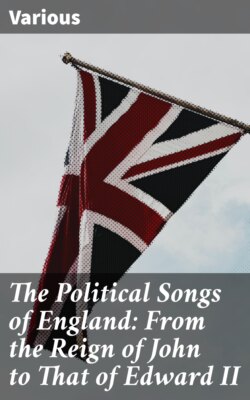Читать книгу The Political Songs of England: From the Reign of John to That of Edward II - Various - Страница 21
На сайте Литреса книга снята с продажи.
THE SONG OF THE WELSH.
Оглавление[From the Public Library of Leyden, MS. Vossius, No. 104, fol. 144, ro. of the 13th cent.]
Trucidare Saxones soliti Cambrenses
Ad cognatos Britones et Cornubienses;
Requirunt ut veniant per acutos enses,
Ad debellandos inimicos Saxonienses.
Venite jam strenue loricis armati;
Sunt pars magna Saxonum mutuo necati,
Erit pars residua per nos trucidati:—
Nunc documenta date qua sitis origine nati.
Mellinus veredicus nunquam dixit vanum;
Expellendum populum prædixit vexanum.
Et vos hoc consilium non servatis sanum;
Cernite fallaces quorum genus omne profanum.
Prædecessor validus rex noster Arturus
Si vixisset hodie, fuissem securus
Nullus ei Saxonum restitisset murus;
Esset ei[s] sicut meruerunt in prece durus.
Procuret omnipotens sibi successorem
Saltem sibi similem, nollem meliorem,
Qui tollat Britonibus antiquum dolorem,
Et sibi restituat patriam patriæque decorem.
Hoc Arturi patruus velit impetrare,
Sanctus [qui]dam maximus, Anglum ultra mare;
Scimus festum Martis kalendis instare,—
Ad natale solum Britones studeat revocare.
Virtuosos filii patres imitantur;
Sic Arturum Britones virtute sequantur:
Quam probo, quam strenuo monstrant procreantur;
Ut fuit Arturus sic victores habeantur!
Regnabat Parisius potestas Romana,
Frollo gygas strenuus, cujus mens ursana;
Hunc Arthurus perimit, credit fides sana,
Testis tentorium sit et insula Parisiana.
Insanit qui Britones necat generosos;
Videtur quod habeat sic eos exosos,
Namque per invidiam clamat odiosos
Semper et assidue, quos audit victoriosos.
Ex hac gente iiijor sunt imperatores,
Arthurus, Broinsius, fortes bellatores,
Constantinus, Brennius, fere fortiores.
Hii monarchiam tenuerunt ut probiores.
Solum suum Karolum Francia præjectat;
Et Ricardum Anglia probitate jactat;
Paucitatem numerus major labefactat,
Virtutem regis quia quadrupla gloria mactat.
Istis suis finibus contigit regnare;
Illis duces, præsides, reges triumphare,
Quibus nullo merito se possint æquare;
Est quam regnare longe plus induperare.
Translation.—The Cambrians, who are used to slay the Saxons, salute their relations the Britons and Cornish-men: they require them to come with their sharp swords to conquer their Saxon enemies.—Come now, vigorously, armed with coats of mail; a great part of the Saxons are fallen in mutual slaughter, the remainder shall be slain by us: now is the time for you to show of what blood you are sprung.—The soothsayer Merlin never said a thing that was vain; he foretold that the mad people should be expelled. And you do not keep this wise counsel; observe deceitful people of whom the whole race is accursed.—If our valiant predecessor, King Arthur, had been now alive, I am sure not one of the Saxon walls would have resisted him; he would have been hard to them, spite of their prayers, as they have deserved.—May the Omnipotent procure him a successor only similar to him, I would not desire a better, who may deliver the Britons from their old grievance, and restore to them their country and their country’s glory.—May it please the uncle of Arthur to obtain this for us, a certain very great saint, [to send] the Englishman over the sea; we know that his festival is approaching on the kalends of March (St. David’s day), may he make it his study to recall the Britons to their native land.—Sons imitate their virtuous fathers, so let the Britons take Arthur for their example in valour; they show from what a good and brave man they are descended; as Arthur was, so let them be, conquerors!—The Roman power reigned at Paris, the bold giant Frollo, with the bearish mind; him Arthur slew: every person of good faith believes it: witness the tent and the Parisian island.—He is a madman who kills the noble Britons: it seems that he holds them thus hated; for he invidiously proclaims them hateful always and incessantly, who he hears are victorious.—Of this nation there have been four great commanders, Arthur and Broinsius, powerful warriors; Constantine and Brennius, more powerful, if it were possible; these held the monarchy by reason of their being the best.—France can only boast of her Charlemaine; and England glories in the valour of King Richard; a larger number overcomes a smaller, because a four-fold glory increases the valour of the King.—To these latter it was granted to reign within their own bounds; to the others, to triumph, over commanders, governors, and kings, with whom they can in no respect claim equality: it is a far greater thing to command, than to reign.
The following fragment of what appears once to have been a long ballad, made to be sung in the halls of the Barons, seems to have been written soon after the disturbances in London in 1263, though there is not enough preserved to enable us to determine the precise occasion on which it was composed. Several nobles are here joined together, who afterwards took different sides.
